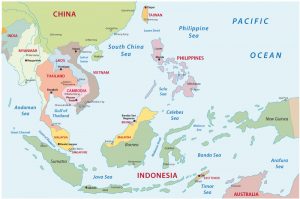In honor of Earth Day, I salute The Orangutan Project. That’s because this organization takes a holistic approach to wild animal rescue. Simply put, it also focuses on land conservation. For this organization, both issues are intimately intertwined.
Holistic Conservation
At first, I didn’t understand the pairing these two words. In my mind, “holistic” applied to medicine. But The Orangutan Project shows how it’s a fundamental approach to saving both wild areas and wildlife.
Orangutan = person of the forest
To help you feel a heart connection to orangutans, just remember that their name literally means ‘person’ (orang) ‘of the forest'(utan/hutan) in the local languages.
Where in the world is The Orangutan Project?
The Orangutan Project works in Sumatra and Borneo, Southeast Asia. It not only focuses on orangutans, but watches out for Sumatran tigers’ and Sumatran elephants’ survival.

This is particularly lovely for me since I’ve visited Southeast Asia (The Philippines, Thailand, Singapore, Australia). So I have fond memories of my visits.
If you want another chance to connect heart-wise to orangutans, watch this video from the Orangutan Project!
What does Holistic Conservation mean?
Here’s what Holistic Conservation means to The Orangutan Project (Note: Much of this information comes directly from their website):
- Legally protected forests
- Secure, restore and patrol orangutan habitats
- Rescue, rehabilitate and release infant orangutans and displaced orangutans
- Educate and empower the local communities and indigenous people
Legally protected forests
The Orangutan Project shared, “Over 80% of orangutans live in unprotected forests. [Sadly,] this puts them at an even greater risk of extinction. [That’s because] their forest habitat can be converted to plantations, logging concessions, mining and other agriculture.”
In order for orangutans to have a place to live, The Orangutan Project partners with a half dozen organizations to protect more forest land every year. They accomplish this through legal support cases. That way, scientists and communities have a say in how the forests will be used. Happily, it’s working.
Patrolling habitats
Why do we need to patrol habitats? Because “The presence of patrols and guard posts greatly deter illegal activities. [In case you don’t know, these illegal activities include] encroachment, logging and poaching.”
Employment is crucial
In order to gain support of the local folks, The Orangutan Project hires them. And trains them. This way, people become educated about and invested in the importance of protecting their own forests.
Additionally, this income means local people don’t need to exploit the forest to make a living.
Rescue, rehabilitation and release
So what careers have been created through The Orangutan Project? There are numerous orangutan rescue teams in Sumatra and Borneo. These teams are highly trained and skilled. Their mission is to relocate wild orangutans in high-risk situations into protected forest habitat.
In order to prepare orphaned and rescued orangutans to return to the forest, these organizations created “Forest Schools.” And of course, local folks with training and good hearts nurture and guide the orangutans as they grow.
Educate and empower local people
As you’ve read in previous paragraphs, the project works with the people who share the land with these animals! That’s because empowering local folks is critical to the project’s success.
They support numerous mobile education programs. These programs deliver practical education and training to local people living in or near forest ecosystems. This way, they learn about sustainable living practices.
In addition, local folks learn how their own lifestyle can help the “people of the forest” survive and thrive.
Other charities I support
Do you support a non-profit that protects wild areas and wildlife? I’d love to hear more!

